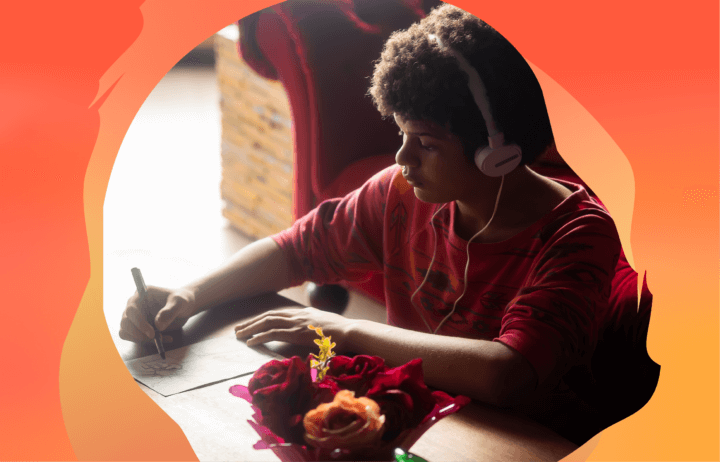Youth's Lives Every Day
Jake Shane (Octopusslover8) is an influencer and comedian who went viral for his hilarious reenactments of historical events on TikTok. He was nominated for a Streamy Award in 2023 and included in TikTok’s inaugural LGBTQ+ Pride Visionary Voices List.
Jake consistently posts about his mental health on social media, and has publicly shared with his followers about his anxiety and obsessive-compulsive disorder. In January 2024, Jake launched his Therapuss podcast, a talk show that puts Jake in the proverbial therapist’s chair. He recently interviewed with Charli XCX, Joe Jonas, Saweetie, Lizzy McAlpine, Glen Powell, and many more.
The Trevor Project had the opportunity to ask Jake some questions around his personal life, mental health, and identity.
Your USA Today interview with David Oliver is incredible. You mention experiencing anxiety at a young age around your gay identity. When you were younger, what would have made you feel more comfortable or mitigated some of that anxiety?
First off, thank you. I have a really easy time being vulnerable about my mental health but I do get insecure once I talk about it that someone will say I’m being dramatic. I honestly don’t know…probably not much other than medication. Having OCD is really, really tough especially when your symptoms are so niche and catered to your fears. I would say seeing my anxiety represented in mainstream media always gave me solace in the fact I wasn’t alone which lessened the fear that I was the only person who felt that way.
Taking care of your mental health while managing an online persona can be tough — whether you have 100 followers or 1 million. Can you share your experience around managing anxiety and taking care of your mental health when showing up online?
I literally don’t. My anxiety is worse than ever and I’m medicated. I’m my own worst enemy though, and I check social media at all times of the day. I’m addicted. The career itself seems so fleeting and based in public opinion which really scares me.
Having strong support systems can positively impact a young LGBTQ+ person’s mental health. For you, it’s great to hear that your friends and roommates are there for you. When you’re experiencing challenging moments, in what ways do they show up for you?
They just listen to me. It’s the most important thing. They let me talk out my anxieties and help me with solutions that could help. Sometimes I just wanna feel validated, it makes me feel less alone and supported.
Therapuss is going on tour this fall. In addition to fun, excitement, and laughter, what feelings or learnings do you want audiences to walk away with?
I want everyone to feel the same way I feel watching Lena Dunham on HBO’s Girls…that being flawed is normal, sometimes frustrating, and, most of all, hilarious.
You share with USA Today the importance of being heard and validated. The Trevor Project trained crisis counselors practice non-judgment, empathy, and active listening. They are also LGBTQ+ competent, and the national 988 Suicide and Crisis Lifeline has a dedicated LGBTQ+ subnetwork to support LGBTQ+ contacts. Why do you think it’s important to provide specialized services to LGBTQ+ crisis contacts?
Being LGBTQ+ is an incredibly unique experience…one that those who don’t experience it have a hard time understanding all the nuances that go into it. It’s important for people in the community to talk to their peers confidently, and with the comfort that, in some capacity, they’ve experienced something similar.


